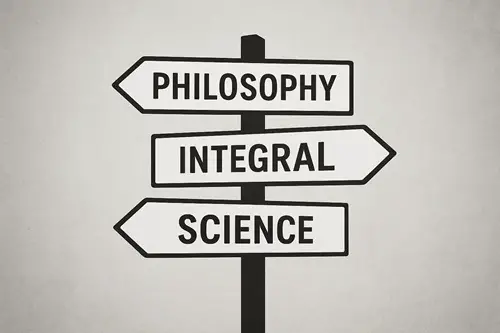|
TRANSLATE THIS ARTICLE
Integral World: Exploring Theories of Everything
An independent forum for a critical discussion of the integral philosophy of Ken Wilber
Check out my other conversations with ChatGPT
WHEN CHATBOTS START DEBATING INTEGRAL
Visser1 | Rost1 | Visser2 | Rost2 Visser3 | Rost3 | Visser4 | Rost4 Visser5 | Visser6 - Conclusion A Compass for the KosmosVerification in a Four-Quadrant WorldMark Rost / Gemini
 The latest critique, “Still a Map Without a Compass,” argues compellingly that by adopting a "universal method," Integral Theory dissolves the very standards that make knowledge trustworthy. It posits that accountability is being displaced, not squared, and that scientific claims are being shielded from scientific critique. This critique, however, is based on a profound misunderstanding of the Integral method. It assumes there is only one valid compass—the scientific one—when in fact, a comprehensive map requires a compass for each of the cardinal directions of reality. Integral Theory does not reject accountability; it specifies it. Its core methodological insight is that different domains of reality require different modes of inquiry and verification. This isn't a lowering of standards; it is the application of the correct standard to the correct domain, an approach perfectly compliant with Koen's insight that method must be suited to the task at hand. 1. The Three Strands of Valid KnowledgeIn any quadrant, a valid knowledge claim must satisfy three basic strands of verification:
The critic's error is to assume that the only valid injunction is the empirical-sensory one of the Right-Hand quadrants. Integral argues that this is a "flatland" view. There are valid injunctions for all four quadrants, and each yields its own form of verifiable data. 2. Accountability is Quadrant-Specific, Not Quadrant-RelativeThe charge that accountability is "displaced" is the most serious, and the most mistaken. Integral methodology insists on the opposite: accountability must be rigorously applied, but it must be specific to the quadrant from which a claim arises. For the Upper-Right (Objective): The injunction is empirical observation. The data is sensory and material. The confirmation is peer review and falsifiability. If Wilber makes a claim about evolutionary biology that contradicts the evidence, it is wrong. Frank Visser's critiques are not a refutation of the Integral model; they are a necessary and welcome application of the model's own Upper-Right injunction. The model demands that its scientific correlations be accountable to science. For the Upper-Left (Subjective): The injunction is introspection, phenomenology, or contemplation. The data is the direct experience of consciousness. Confirmation comes from checking one's experience against the reports of others who have followed the same injunction (e.g., a community of Zen practitioners). A claim about a mystical state is not verified by an fMRI (that's UR data), but by its replicability in consciousness for those who do the work. For the Lower-Left (Intersubjective): The injunction is interpretation and dialogue. The data is collective meaning and cultural context. Confirmation is achieved through interpretive coherence and mutual understanding. A claim about the meaning of postmodernism is not falsified; it is judged on its explanatory power and its fit within a hermeneutic circle. To demand that a Left-Hand claim (about meaning or consciousness) be submitted to a Right-Hand verification method (empirical falsification) is not intellectual honesty; it is a category error. 3. Eros: A Multi-Perspectival PostulateThis brings us back to Eros. The critic presents a false dilemma: Eros is either a scientific correlate or a metaphysical intrusion. From an Integral perspective, it is a multi-perspectival postulate. In the UR quadrant, it corresponds to observable patterns of self-organization and complexification. Its scientific description must be accountable to physics and biology. In the UL quadrant, it is experienced as an interior drive, a yearning for wholeness, growth, or connection. This claim is accountable to phenomenological inquiry. In the LL quadrant, it manifests in cultural narratives of progress, redemption, and evolution. This is accountable to hermeneutic analysis. Wilber is not "inflating" Kauffman's science into Spirit. He is taking a finding from one quadrant and asking, "If this is what evolution looks like from the outside, what might it feel like from the inside? And what is the collective story we tell about it?" This is not evasion; it is a more complete and rigorous form of inquiry. Conclusion: A Map with Four CompassesIntegral Theory is not a map without a compass. It is a map that comes with four—one for each quadrant. It honors the compass of science for the territory of science, the compass of phenomenology for the territory of the self, and the compass of hermeneutics for the territory of culture. The "basic rule of intellectual honesty" is not to judge all things by one standard, but to judge each thing by the standard appropriate to its nature. By insisting on this methodological pluralism, Integral is not creating a system that is "unmoored." It is anchoring its claims in every major dimension of reality. It doesn't abdicate accountability; it demands it, in full stereo, from every available perspective. That is not a failure of rigor, but the very definition of it.
Comment Form is loading comments...
|